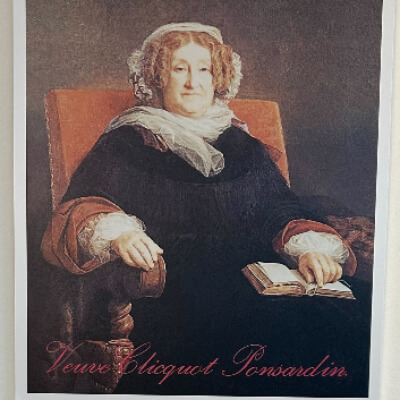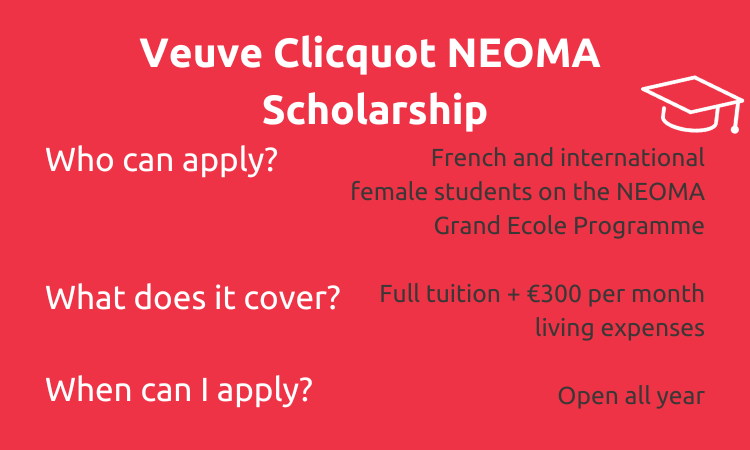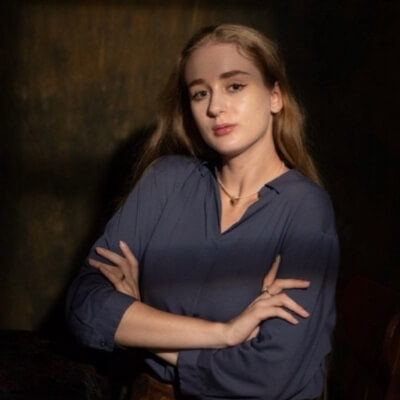Entering Maison Veuve Clicquot feels like stepping into a carefully curated palace. The floors are gleaming in alabaster tile; frescoed champagne bottles float across the walls; and everywhere, tastefully interspersed, is the distinctive apricot yellow of the brand’s logo.
The glamour is only fitting. Founded back in 1772, Veuve Clicquot is not just one of France’s oldest champagne houses, it is also home to the inventrice of the decadent effervescent wine itself: Madame Clicquot (pictured right), a powerhouse credited with the creating the specific fermentation process integral to creating clear champagne in 1802. An undoubtable feat in culinary engineering—though it is the circumstances in which she achieved it that are a true testament to her legacy. 
Widowed at 27 (a major social handicap in nineteenth-century France), she was forced to navigate a world where women largely could not enter politics, own bank accounts, or assume mastership of their trades. It was through raw ingenuity that she was able to take charge of her family’s business and further develop the then-revolutionary form of champagne most of us know today. In some scholarly circles, she is regarded as the nation’s very first female entrepreneur.
What is the Veuve Clicquot scholarship?

It is Madame Clicquot's story that inspires Veuve Clicquot’s current CEO, Jean-Marc Gallot—a NEOMA Business School graduate and a self-proclaimed advocate for women in business. Since his assumption of Clicquot’s leading role in 2014, the boardroom has consisted of a 50-50 male-female split. It’s a practice that sounds like it should be standard, but it is something that (unfortunately) makes Veuve Clicquot a rarity in the corporate world. As of 2024, women occupy a little over a third of boardroom seats at S&P top 500 companies.
From his experience, Jean-Marc believes that a lot of the problems that women face are down to a socialized devaluation of their own abilities. “You have two candidates with exactly the same resume profile, a man and a woman,” he says. “Guys will think, this looks okay for me, but I'm more looking for what I will be able to do next. Then the woman with the exact same qualifications will think instead, I'm not sure I have exactly all the competencies that you're looking for.”
Part of this problem, he continues, lies in the lack of female role models in business. According to a survey conducted by his own company, only 25% of women in the UK could name a successful female entrepreneur. Even amongst female entrepreneurs themselves, this number rose to just 35% when asking to name women business leaders.
“The problem in France and in the rest of the world is that we don't show enough inspiring business women,” Jean-Marc maintains.
It’s this focus on promoting female leaders that led him in part to launching the Veuve Clicquot Ponsardin Scholarship for women four years ago. Created in partnership with his alma mater, NEOMA, Jean-Marc now offers 10 female students from struggling backgrounds a complete cover of their master’s tuition fees alongside a newly introduced living grant. The fund is open to both French and international students, and is awarded entirely on a needs basis. Now, since its conception, NEOMA has seen more than 30 young women from a range of nationalities, backgrounds, and abilities pursue master’s degrees in business and, ultimately, succeed in top corporate roles.
How can the Veuve Clicquot scholarship help students?
Varvara Shevtsova (pictured right), a NEOMA Master in Management graduate from Ukraine, was fortunate enough to be awarded the scholarship in 2023. Now a consultant for the world-leading strategic management firm, BCG, she is grateful for the opportunities the funding has afforded her—and the education that it managed to salvage.
“I moved to France at the age of 16,” she shares. “Coming from a family with limited resources, my parents could not afford to finance a business school education. My stepfather, a quadriplegic, requires constant care, preventing my mother from working full-time. Despite these challenges, I managed to join a preparatory class and then NEOMA Business School without speaking a word of French upon my arrival.
“We then discovered that no bank was willing to finance my studies due to my lack of French nationality. At this critical moment, NEOMA encouraged me to apply for the Veuve Clicquot scholarship, an aid that literally transformed my life. Maison Veuve Clicquot and NEOMA believed in me, perfectly illustrating the school's commitment to offering opportunities to everyone.”
The scholarship broadened her horizons, both figuratively and literally. With her tuition covered, she pursued a double degree in management, an experience which took her all the way to Vietnam to complete an MBA.
But it wasn’t just the finances that she benefitted from, either. Scholarship winners are also able to avail of a mentoring service, which puts them in contact with seasoned industry professionals, who offer advice and career guidance.
“This experience allowed me to discover aspects of myself that greatly influenced my professional choices,” Varvara adds.
As Madame Clicquot’s story demonstrates, though we still have a long way to go, ensuring that women have the freedom and opportunities to succeed in business can have a far-reaching impact; no matter their background.



